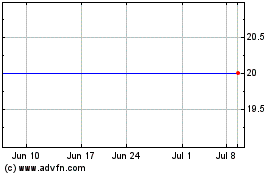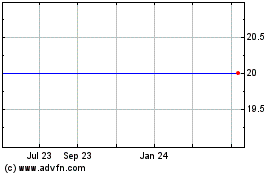By Jared S. Hopkins and Denise Roland
Two of the world's biggest drugmakers struck multibillion-dollar
deals on Monday aimed at bolstering their lineups in the fiercely
competitive cancer-drugs market.
Merck & Co. said it would acquire ArQule Inc. for about $2.7
billion, paying a 107% premium in a bid to diversify its cancer
treatments beyond top-selling drug Keytruda. Meanwhile, Sanofi SA
said it would spend $2.5 billion, a 172% premium, to acquire
Synthorx Inc. in the French drugmaker's own effort to catch up with
oncology rivals.
Both deals reflect the industry's intense pursuit of new
products to sell in one of the world's biggest and fastest-growing
prescription-drug segments. The $123 billion world-wide
cancer-drugs market is expected to almost double by 2024, according
to a market-research firm, EvaluatePharma.
Bristol-Myers Squibb Co. recently closed on its $74 billion
acquisition of rival Celgene Corp. to create a cancer-drugs
powerhouse. Pfizer Inc., which has positioned itself to focus on
cancer, bought Array BioPharma for $10.6 billion this summer. And
Eli Lilly & Co. acquired Loxo Oncology for about $8 billion
earlier this year.
The promise of new sales in a lucrative market appeals to
pharmaceutical companies, which are counting on cancer treatments
to provide new revenues as older products lose patent
protection.
Making the segment even more attractive is the U.S. Food and
Drug Administration's willingness to approve new cancer drugs with
smaller, faster and less-expensive clinical trials. And companies
have found that health plans will pay for cancer drugs, even at
prices that often top $100,000 for a year's treatment.
Scientific breakthroughs, including the ability to target
specific mutations and combine medicines, are also helping drive
the industry's interest, said Roy Baynes, Merck's senior vice
president of global clinical development and chief medical
officer.
"The science is evolving very rapidly," Dr. Baynes said in an
interview. "The good news is that we are now focused on drugs which
really do have big effect."
But the interest in finding the next big new product has driven
up the prices that big drugmakers have had to pay. Companies have
paid mean premiums of 114% this year for small- to midsize deals
such as Sanofi's and Merck's, up from 67% during the previous five
years, according to analysts at Evercore ISI. The data are for
drugs of all stripes, not just cancer treatments.
And the commercial market for cancer treatments has become
hard-fought, forcing companies to race to be the first or second to
market to secure a position before rivals.
Merck agreed to pay $20 a share in cash for ArQule, of
Burlington, Mass. The deal is expected to close early in the first
quarter of 2020.
It would increase Merck's offerings of therapies that treat
blood-related cancers. ArQule's lead experimental treatment, called
ARQ 531, is being tested in patients with blood cancers who carry a
specific genetic mutation that prevented them from responding to
previous treatments.
"It's early, but it looks like it has a lot of potential," Dr.
Baynes said of the therapy.
Dr. Baynes acknowledged that other companies are developing
therapies similar to ArQule's, but such contests drive
innovation.
Merck has been looking for deals to expand its portfolio of
cancer treatments beyond Keytruda, as some investors and analysts
have worried that Merck has become too dependent on the product.
Keytruda's global sales totaled nearly $7.2 billion last year.
Earlier this year, Merck, of Kenilworth, N.J., bought Tilos
Therapeutics Inc. and Peloton Therapeutics Inc., both of which are
developing cancer therapies.
Citigroup analysts said Merck's expansion in hematology makes
sense because it hasn't been very active in that field, and expects
the deal "to be the beginning rather than the end of similar
moves."
Many of the therapies that big drugmakers are acquiring are
immunotherapies such as Keytruda or complement the drugs, a
relatively new class of treatment that unleashes a patient's own
immune system in the fight against cancer.
Keytruda was once an afterthought buried in Merck's
research-and-development pipeline, but it has become a commercial
juggernaut for the company during the past few years. It is now
approved to treat a wide range of different types of tumors,
including two types of blood cancers.
Companies adding cancer therapies to their pipelines are also
doing so because those with multiple drugs for the same types of
cancer can bundle the treatments in their contracts with
pharmacy-benefit managers, insurers and hospitals. That has become
crucial as health insurers look to what is known as outcome-based
contracting, where costs are tied to whether patients respond to
drugs.
For Sanofi, acquiring Synthorx, of La Jolla, Calif., is an
attempt by the French pharmaceutical company to erase the gap with
rivals that already sell the drugs. Synthorx's lead agent is in the
early phase of patient testing in a range of cancers, both on its
own and in combination with existing cancer immunotherapies.
The deal is the first big move by Sanofi Chief Executive Paul
Hudson, who began leading the company in September, and suggests
that cancer treatment will be one of the company's new
priorities.
Sanofi said it would pay $68 a share in cash for Synthorx.
"This acquisition fits perfectly with our strategy to build a
portfolio of high-quality assets and to lead with innovation," Mr.
Hudson said.
Sanofi is one of the most diversified companies in the industry,
spanning branded prescription drugs, vaccines and over-the-counter
treatments. Within branded drugs, it produces medicines ranging
from insulin for diabetes to specialty medicines for rare
diseases.
Write to Jared S. Hopkins at jared.hopkins@wsj.com and Denise
Roland at Denise.Roland@wsj.com
(END) Dow Jones Newswires
December 09, 2019 19:01 ET (00:01 GMT)
Copyright (c) 2019 Dow Jones & Company, Inc.
ArQule (NASDAQ:ARQL)
Historical Stock Chart
From Mar 2024 to Apr 2024

ArQule (NASDAQ:ARQL)
Historical Stock Chart
From Apr 2023 to Apr 2024
